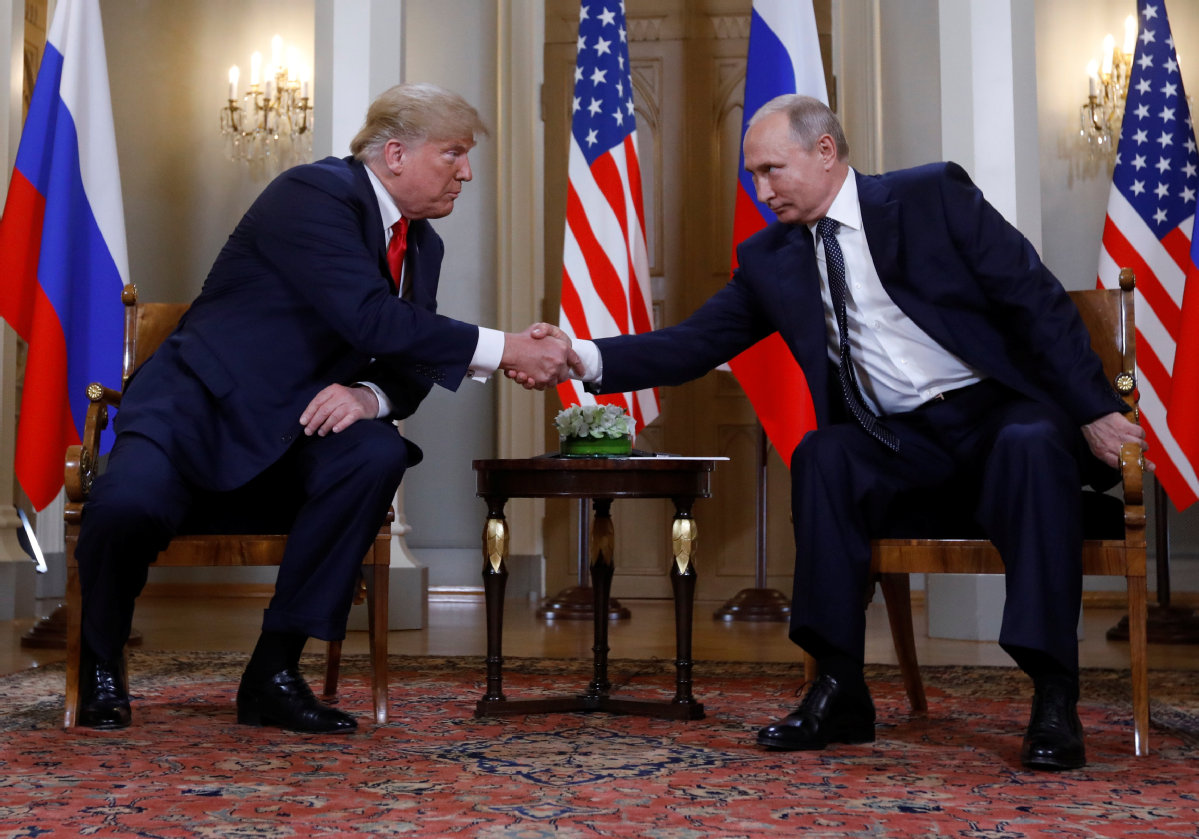Trump and Putin meet at Helsinki summit


Discussions round off eventful European trip for US president
US President Donald Trump and Russia's Vladimir Putin are having their first-ever summit meeting in Helsinki on Monday as Trump's European visit comes to a close.
The two leaders have previously had talks at larger multilateral meetings, but this is the first such personal encounter, behind closed doors with only their translators in attendance.
Trump has said he has "low expectations" for the meeting and tweeted that relations between the countries have never been worse, blaming the situation on "many years of US foolishness and stupidity and now, the Rigged Witch Hunt!" - referring to the on-going investigations into alleged collusion with Russia around his 2016 election win.
On Friday, 12 Russians were charged with hacking the 2016 US elections, leading some people to call for Trump to cancel the talks.
He said he would raise the topic in the meeting, but that there is no formal agenda for what will be discussed.
Moscow rejects allegations of electoral interference, but Russian news agency RIA said Putin was "ready for dialogue" on the issue and hoped the discussions could improve relations between the two nations.
It is also expected that arms control and Syria issues will be discussed.
Professor Chris Rowley of Kellogg College, Oxford, told China Daily that the similarity in leadership style between Trump and Putin would make it an intriguing and unpredictable meeting.
"Both leaders can be seen in similar molds – as leaders based on autocratic, ethnocentric, patriotism," he said.
Earlier on this trip, particularly at meetings with Nato leaders and British Prime Minister Theresa May, Trump had demonstrated what Rowley called his “typical gameplan” of being a “bombastic business person who is simply not open to questioning and likes to be a disruptive force,” only to then backtrack. But Rowley said this approach might not work on Putin.
"Putin is often more inscrutable in his leadership style,” he said.
“Trump has treated Putin almost as a ‘hero’- the myth of the ‘strongman’ - in the past and rarely criticized him publicly."
Ted Carpenter, a senior fellow of defense and foreign policy studies at Washington-based Cato Institute, said the feeling coming from the US about the summit was “not encouraging”, with many people suggesting the meeting is a compromise to Putin.
“It is an unhealthy, unrealistic view of foreign affairs. A willingness to meet and negotiate in good faith with foreign adversaries is a crucial aspect of successful diplomacy, and Washington has achieved important successes by doing so,” said Carpenter, citing the normalization of relations between the US and China and the arms control agreement between the US and former Soviet Union during the Cold War.
But he added that Trump’s position of seemingly wanting to change relations between the countries on a higher level, rather than focusing on discussing smaller issues, could have a positive outcome.
“That is a useful objective, and building a more cordial overall relationship is an important prerequisite for more detailed, productive negotiations,” he said.
“That process would be the foundation of a lasting ‘reset’ in bilateral relations and make Europe and the rest of the world a safer place.”
Wang Mingjie in London and Chen Weihua in Beijing contributed to this story.

































